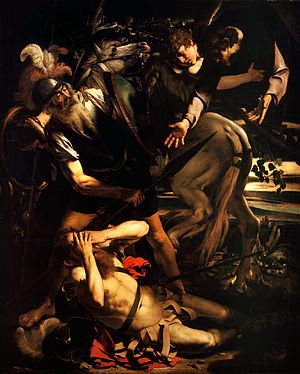If you were to consult a catalogue of saints, you would not find the name of Zacchaeus listed. Do you recall who he was—the wealthy tax collector who was so short that he had to climb a sycamore tree to see Jesus when he passed through Jericho. Was he if fact a saint? I would say “yes,” not on my own whim be on the authority of Saint Paul’s description of the ideal Christian, the “saint”: “May God . . . powerfully bring to fulfilment every good purpose . . . that the name of our Lord, Jesus Christ, may be glorified in you.”[1] Well, isn’t that exactly what Zacchaeus did? “He brought to fulfilment every good purpose” when, as he told Jesus, “Behold, Lord, half of my goods I give to the poor, and if I have defrauded anyone of anything, I restore it fourfold.”[2] So, let us invoke today the patronage of Saint Zacchaeus, the patron saint of Bay Street billionaires, that they—and we—shall use our financial resources to aid the poor and to compensate the defrauded.
Stories of conversion are always attractive, and there are some striking ones in the New Testament. The man born blind, for instance, as he fell at the feet of Jesus, exclaimed, “Lord, I believe.”[3] And the Gerasene demoniac “went away, proclaiming throughout the whole region, how much Jesus had done for him.”[4] Saint Paul, of course, is the classic case of an abrupt change of heart who fell to the ground “at once, with a crash,” only to rise a new man. It was different with Peter—and, for that matter, with the other Apostles—whose conversion was not completed until Pentecost. The history of the Church, too, exhibits similar patterns. Brother André seems to have been an instance of the abrupt alteration, while Saint Augustine, like John Henry Newman, experienced a slow ascent to faith, “a lingering out, sweet skill.”[5]
And ourselves? How do we fit into these instances of conversion? In theory, our mode of life was decided for us at baptism, which signalled a total following of Christ, but that commitment has later to be consciously ratified. Thus, Saint Paul’s words to those Thessalonians still have to be completed in us today, however strong our initial commitment may have been. “May God . . . powerfully bring to fulfilment every good purpose . . . that the name of our Lord, Jesus Christ, may be glorified in you.
[1] 1 Thess 1.13.
[2] Lk 19.8.
[3] Jn 9.39.
[4] Lk 9.39.
[5] “. . . Whether at once, as once at a crash Paul,/Or as Austin, a lingering-out sweet skill,/Make mercy in all of us. . . .” Gerard Manley Hopkins, The Wreck of the Deutschland.


